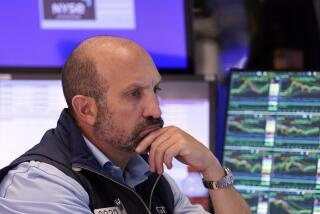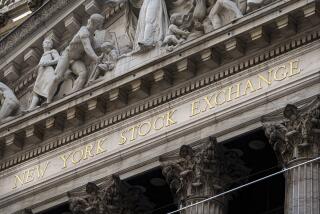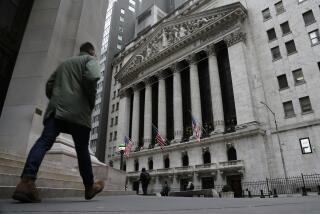Fear of German Rate Hike Hits Markets
- Share via
The Federal Reserve Board, the usual focal point of Wall Street’s fears, may soon be elbowed out of the spotlight by its Teutonic rival: the Bundesbank.
Growing concern that the German central bank is on the verge of tightening credit--ending five years of flat to lower short-term interest rates--has swept over markets here and in Europe in recent weeks, boosting bond yields and depressing stock prices.
With German economic growth and inflation both on the rise, expectations of higher German rates have been manifested most clearly in the value of the German mark relative to the U.S. dollar.
For most of this year the muscle-bound dollar has surged against the mark, reaching a six-year high of 1.880 marks by Aug. 6. But since then the mark has strengthened sharply; by Tuesday the dollar bought 1.799 marks in New York, nearly 5% fewer than just three weeks ago.
Although currency values are notoriously volatile, many traders say the demand for marks reflects a belief that higher German rates are on the way--which could make interest-bearing German investments more appealing for global investors.
Meanwhile, the German stock market also appears to be coming to grips with the possibility of higher rates: The blue-chip DAX stock index on the Frankfurt Stock Exchange plummeted 112.46 points, or 2.8%, to 3,959.33 on Tuesday and now has slumped 11% since reaching an all-time high on July 31.
Because Germany is the dominant economy of Europe, any rise in German interest rates is likely to trigger a chain reaction of higher rates throughout Europe. That, in turn, could put upward pressure on U.S. rates, and also hurt the U.S. economy if demand for U.S. exports were to ease with a slowing European economy.
Indeed, other than the Federal Reserve and the Bank of Japan, no world central bank has as much influence as the Bundesbank.
“There will be very, very big implications” if the Bundesbank acts, says Ray Dalio, investment chief at currency and bond firm Bridgewater Group in Wilton, Conn.
Why would the Germans raise rates? Because inflationary pressures have been building all year, despite the accepted global wisdom that inflation is “dead.”
On Tuesday, the German government said the August consumer prices inflation rate, measured at mid-month, was up 2% from a year ago, a sharp acceleration from the 1.4% annualized inflation rate of spring. And the rise in inflation has coincided with more signs of economic expansion in Germany, including a surge in industrial output in June.
Bundesbank officials, legendary for a paranoia about inflation that is rooted in the country’s 20th century experience with hyper-inflation, have lately been quick to warn that the central bank’s record-low 3% “repo” rate, its benchmark short-term interest rate, may have to rise to cool the economy and slow inflation.
*
But could they simply be talking tough--jawboning in the manner of Fed Chairman Alan Greenspan?
Some analysts think so. For one thing, nobody in Europe wants the Continent’s already terribly high unemployment rates to rise further, which could easily happen if the economy downshifts again because of higher interest rates.
Second, the planned European Monetary Union, decades in the making and now scheduled for Jan. 1, 1999, could be thrown off track in a hurry by rising German interest rates.
Joachim Fels, analyst at Morgan Stanley Dean Witter, believes that the rebound in the German economy and in inflation merit higher German rates. But “although it has become a tough call, I continue to believe that the politics of EMU and unemployment will induce the Bundesbank to postpone tightening until next spring.”
If they are in fact jawboning, Bundesbank officials are already creating the desired effect in markets: The strengthening German mark is beginning to alleviate one of the root problems driving up inflation.
As the mark weakened over the last year, its positive impact was to lower the price of German exports abroad--which provided a needed boost for German manufacturers, and thus for the long-struggling economy.
But the weak mark has had another effect: It drove up the cost of goods Germany imports, including oil, which is priced in dollars.
Indeed, economists say that much of the higher inflation that Germany is experiencing is import-driven. Strengthen the mark a bit more, and those inflation pressures could be dampened significantly.
The most optimistic scenario is that the mere fear of higher German rates will continue to boost the mark at the dollar’s expense, pushing inflation down--and eliminating the need for the Bundesbank to actually tighten credit.
But some analysts aren’t so sure that jawboning will work for long. “I think there is a pretty high probability that they will tighten” in the fall, says Dalio.
Or as Robert Froelich, chief investment strategist at Zurich Kemper Investments says of the Bundesbank: “You can only cry wolf so often.”
Conceivably, the Bundesbank might not have to do much: Analysts say the money markets are at worst expecting a quarter- to a half-percentage point rise in the 3% repo rate by year’s end.
For Americans, the bigger question is how troubling a German rate hike would be for U.S. markets.
In theory, rising European rates could push up U.S. bond yields. But the yield on two-year U.S. Treasury notes, now 5.98%, is already 2 full percentage points above the yield on two-year German notes.
Isn’t that enough of a premium to keep global investors from fleeing U.S. bonds? In the long run, it probably is.
Moreover, even if U.S. yields do rise, that could lower the risk that the Fed, too, would begin tightening credit, because the bond market would be doing the Fed’s anti-inflation work for it. (Global markets’ true nightmare scenario is that the Bundesbank, the Fed and the Bank of Japan all begin raising rates simultaneously. For now, there seems no chance of that: Worries about Japan’s still-weak economy sent 10-year government bond yields there to a record-low 1.99% early today.)
Still, in the short run many investors’ knee-jerk reaction to the first German credit-tightening in five years would probably be to sell across the board--not a pleasant thought for U.S. stock and bond markets that will be entering September in an extremely jittery mood as it is.
Worrisome Turn?
After soaring against the German mark for most of this year, the dollar has been tumbling in recent weeks as some currency traders bet that German interest rates will rise this fall-- making mark-denominated investments more appealing.
Dollars in marks, weekly closes and latest
Tuesday’s close: 1.799
Source: Bloomberg News
More to Read
Inside the business of entertainment
The Wide Shot brings you news, analysis and insights on everything from streaming wars to production — and what it all means for the future.
You may occasionally receive promotional content from the Los Angeles Times.










